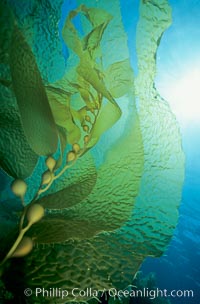
Kelp frond showing pneumatocysts.
Species: Giant kelp, Macrocystis pyrifera
Location: San Clemente Island, California
Image ID: 00627
Species: Giant kelp, Macrocystis pyrifera
Location: San Clemente Island, California
Image ID: 00627
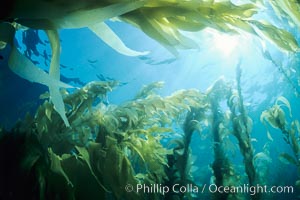
A kelp forest, with sunbeams passing through kelp fronds. Giant kelp, the fastest growing plant on Earth, reaches from the rocky bottom to the ocean's surface like a submarine forest.
Species: Giant kelp, Macrocystis pyrifera
Location: San Clemente Island, California
Image ID: 02411
Species: Giant kelp, Macrocystis pyrifera
Location: San Clemente Island, California
Image ID: 02411
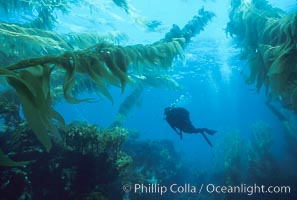
A SCUBA diver swims through a giant kelp forest which is tilted back by strong ocean currents. Giant kelp, the fastest plant on Earth, reaches from the rocky bottom to the ocean's surface like a submarine forest.
Species: Giant kelp, Macrocystis pyrifera
Location: San Clemente Island, California
Image ID: 01107
Species: Giant kelp, Macrocystis pyrifera
Location: San Clemente Island, California
Image ID: 01107
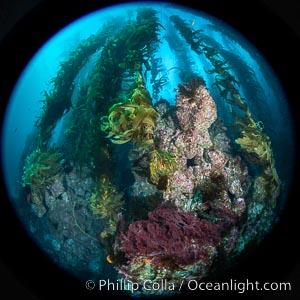
The Kelp Forest and Rocky Reef of San Clemente Island. Giant kelp grows rapidly, up to 2' per day, from the rocky reef on the ocean bottom to which it is anchored, toward the ocean surface where it spreads to form a thick canopy. Myriad species of fishes, mammals and invertebrates form a rich community in the kelp forest. Lush forests of kelp are found throughout California's Southern Channel Islands.
Species: Giant kelp, Macrocystis pyrifera
Location: San Clemente Island, California
Image ID: 38494
Species: Giant kelp, Macrocystis pyrifera
Location: San Clemente Island, California
Image ID: 38494
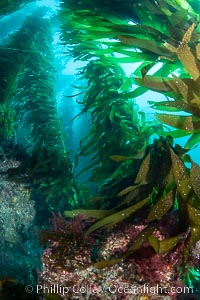
The Kelp Forest and Rocky Reef of San Clemente Island. Giant kelp grows rapidly, up to 2' per day, from the rocky reef on the ocean bottom to which it is anchored, toward the ocean surface where it spreads to form a thick canopy. Myriad species of fishes, mammals and invertebrates form a rich community in the kelp forest. Lush forests of kelp are found throughout California's Southern Channel Islands.
Species: Giant kelp, Macrocystis pyrifera
Location: San Clemente Island, California
Image ID: 38495
Species: Giant kelp, Macrocystis pyrifera
Location: San Clemente Island, California
Image ID: 38495
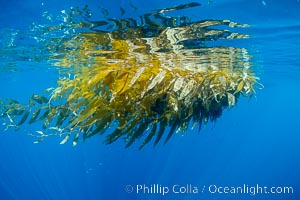
Drift kelp paddy floating on the ocean surface, San Diego.
Species: Giant kelp, Macrocystis pyrifera
Location: San Diego, California
Image ID: 38533
Species: Giant kelp, Macrocystis pyrifera
Location: San Diego, California
Image ID: 38533
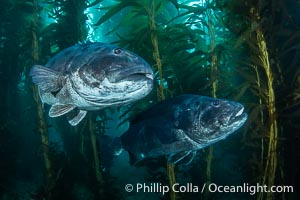
Two Giant Black Sea Bass in a Courtship Posture, in Kelp at Catalina Island. In summer months, black seabass gather in kelp forests in California to form mating aggregations. Courtship behaviors include circling of pairs of giant sea bass, production of booming sounds by presumed males, and nudging of females by males in what is though to be an effort to encourage spawning.
Species: Giant black sea bass, Stereolepis gigas
Location: Catalina Island, California
Image ID: 39432
Species: Giant black sea bass, Stereolepis gigas
Location: Catalina Island, California
Image ID: 39432
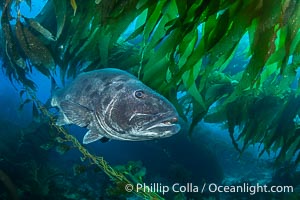
Giant Black Sea Bass with Distinctive Identifying Black Spots that allow researchers to carry out sight/resight studies on the animals distributions and growth. Black sea bass can reach 500 pounds and 8 feet in length.
Species: Giant black sea bass, Stereolepis gigas
Location: Catalina Island, California
Image ID: 39433
Species: Giant black sea bass, Stereolepis gigas
Location: Catalina Island, California
Image ID: 39433
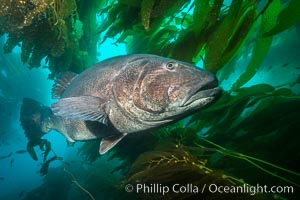
Giant black sea bass, endangered species, reaching up to 8' in length and 500 lbs, amid giant kelp forest.
Species: Giant black sea bass, Stereolepis gigas
Location: Catalina Island, California
Image ID: 33354
Species: Giant black sea bass, Stereolepis gigas
Location: Catalina Island, California
Image ID: 33354
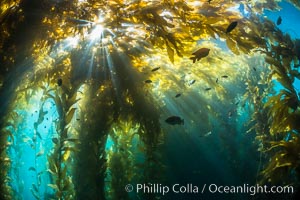
Sunlight streams through giant kelp forest. Giant kelp, the fastest growing plant on Earth, reaches from the rocky reef to the ocean's surface like a submarine forest.
Species: Giant kelp, Macrocystis pyrifera
Location: Catalina Island, California
Image ID: 33433
Species: Giant kelp, Macrocystis pyrifera
Location: Catalina Island, California
Image ID: 33433
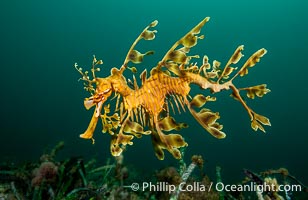
The leafy seadragon (Phycodurus eques) is found on the southern and western coasts of Australia. Its extravagent appendages serve only for camoflage, since it has a nearly-invisible dorsal fin that propels it slowly through the water. The leafy sea dragon is the marine emblem of South Australia.
Species: Leafy seadragon, Phycodurus eques
Location: Rapid Bay Jetty, South Australia
Image ID: 39137
Species: Leafy seadragon, Phycodurus eques
Location: Rapid Bay Jetty, South Australia
Image ID: 39137
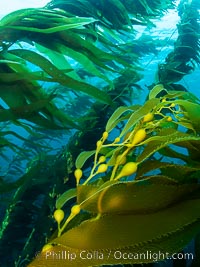
Kelp fronds showing pneumatocysts, bouyant gas-filled bubble-like structures which float the kelp plant off the ocean bottom toward the surface, where it will spread to form a roof-like canopy.
Species: Giant kelp, Macrocystis pyrifera
Location: San Clemente Island, California
Image ID: 38498
Species: Giant kelp, Macrocystis pyrifera
Location: San Clemente Island, California
Image ID: 38498
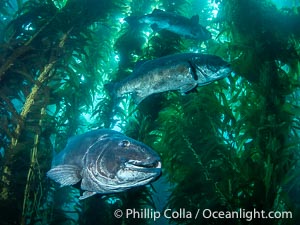
Three Giant Black Sea Bass in a Courtship Posture, Hovering One Above the Other in Kelp at Catalina Island. In summer months, black seabass gather in kelp forests in California to form mating aggregations. Courtship behaviors include circling of pairs of giant sea bass, production of booming sounds by presumed males, and nudging of females by males in what is though to be an effort to encourage spawning.
Species: Giant black sea bass, Stereolepis gigas
Location: Catalina Island, California
Image ID: 39434
Species: Giant black sea bass, Stereolepis gigas
Location: Catalina Island, California
Image ID: 39434
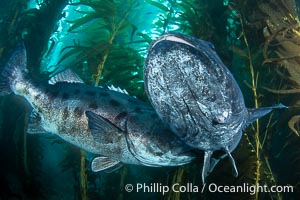
A male giant sea bass nudges a female giant sea bass to encourage spawning as they swim in a tight circle. This courting pair of giant sea bass is deep in the kelp forest at Catalina Island. In summer months, giant sea bass gather in kelp forests in California to form courtship and mating aggregations, eventually leading to spawning.
Species: Giant black sea bass, Stereolepis gigas
Location: Catalina Island, California
Image ID: 39435
Species: Giant black sea bass, Stereolepis gigas
Location: Catalina Island, California
Image ID: 39435
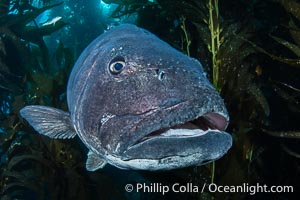
Closeup Portrait of the Face of a Giant Black Sea Bass, showing parasitic sea lice. These parasites find their nutrition from the skin and blood of the host giant sea bass. Smaller fishes such as senoritas and wrasses will commonly clean the sea lice off the giant sea bass.
Species: Giant black sea bass, Stereolepis gigas
Location: Catalina Island, California
Image ID: 39436
Species: Giant black sea bass, Stereolepis gigas
Location: Catalina Island, California
Image ID: 39436
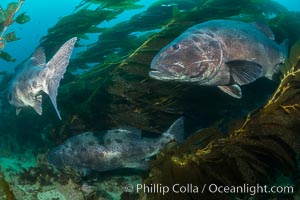
Three giant black sea bass, gathering in a mating/courtship aggregation amid kelp forest at Catalina Island. In summer months, black seabass gather in kelp forests in California to form mating aggregations. Courtship behaviors include circling of pairs of giant sea bass, production of booming sounds by presumed males, and nudging of females by males in what is though to be an effort to encourage spawning.
Species: Giant black sea bass, Stereolepis gigas
Location: Catalina Island, California
Image ID: 33355
Species: Giant black sea bass, Stereolepis gigas
Location: Catalina Island, California
Image ID: 33355
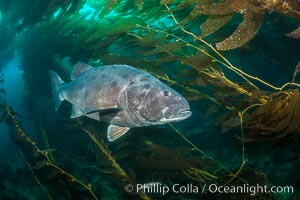
Giant Black Sea Bass with Unique Pattern of Black Spots at Catalina Island. The giant sea bass is an endangered species reaching up to 8' in length and 500 lbs, amid giant kelp forest.
Species: Giant black sea bass, Stereolepis gigas
Location: Catalina Island, California
Image ID: 33356
Species: Giant black sea bass, Stereolepis gigas
Location: Catalina Island, California
Image ID: 33356
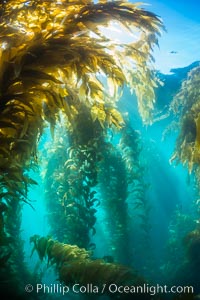
Sunlight streams through giant kelp forest. Giant kelp, the fastest growing plant on Earth, reaches from the rocky reef to the ocean's surface like a submarine forest.
Species: Giant kelp, Macrocystis pyrifera
Location: Catalina Island, California
Image ID: 33434
Species: Giant kelp, Macrocystis pyrifera
Location: Catalina Island, California
Image ID: 33434
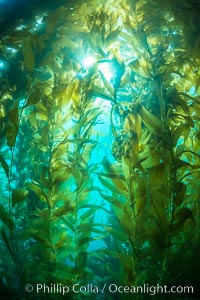
Sunlight streams through giant kelp forest. Giant kelp, the fastest growing plant on Earth, reaches from the rocky reef to the ocean's surface like a submarine forest.
Species: Giant kelp, Macrocystis pyrifera
Location: Catalina Island, California
Image ID: 33435
Species: Giant kelp, Macrocystis pyrifera
Location: Catalina Island, California
Image ID: 33435
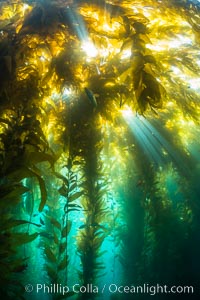
Sunlight streams through giant kelp forest. Giant kelp, the fastest growing plant on Earth, reaches from the rocky reef to the ocean's surface like a submarine forest.
Species: Giant kelp, Macrocystis pyrifera
Location: Catalina Island, California
Image ID: 33436
Species: Giant kelp, Macrocystis pyrifera
Location: Catalina Island, California
Image ID: 33436
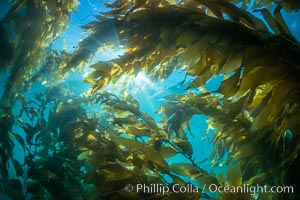
Sunlight streams through giant kelp forest. Giant kelp, the fastest growing plant on Earth, reaches from the rocky reef to the ocean's surface like a submarine forest.
Species: Giant kelp, Macrocystis pyrifera
Location: Catalina Island, California
Image ID: 33437
Species: Giant kelp, Macrocystis pyrifera
Location: Catalina Island, California
Image ID: 33437
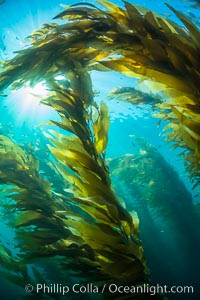
Sunlight streams through giant kelp forest. Giant kelp, the fastest growing plant on Earth, reaches from the rocky reef to the ocean's surface like a submarine forest.
Species: Giant kelp, Macrocystis pyrifera
Location: Catalina Island, California
Image ID: 33438
Species: Giant kelp, Macrocystis pyrifera
Location: Catalina Island, California
Image ID: 33438
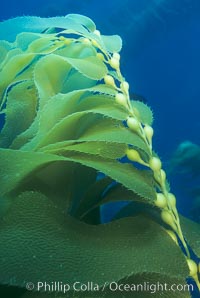
Kelp frond showing pneumatocysts.
Species: Giant kelp, Macrocystis pyrifera
Location: Santa Barbara Island, California
Image ID: 02435
Species: Giant kelp, Macrocystis pyrifera
Location: Santa Barbara Island, California
Image ID: 02435
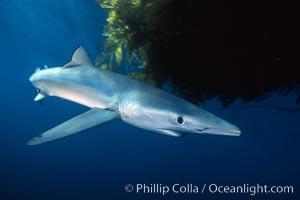
Blue shark and offshore drift kelp paddy, open ocean.
Species: Blue shark, Macrocystis pyrifera, Prionace glauca
Location: San Diego, California
Image ID: 01078
Species: Blue shark, Macrocystis pyrifera, Prionace glauca
Location: San Diego, California
Image ID: 01078
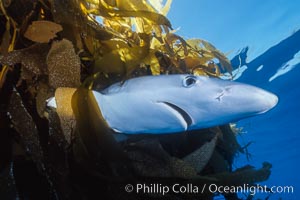
Blue shark and offshore drift kelp paddy, open ocean.
Species: Blue shark, Macrocystis pyrifera, Prionace glauca
Location: San Diego, California
Image ID: 01081
Species: Blue shark, Macrocystis pyrifera, Prionace glauca
Location: San Diego, California
Image ID: 01081
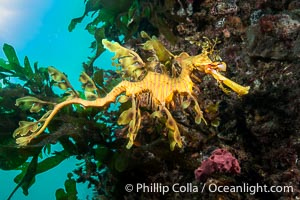
The leafy seadragon (Phycodurus eques) is found on the southern and western coasts of Australia. Its extravagent appendages serve only for camoflage, since it has a nearly-invisible dorsal fin that propels it slowly through the water. The leafy sea dragon is the marine emblem of South Australia.
Species: Leafy seadragon, Phycodurus eques
Location: Rapid Bay Jetty, South Australia
Image ID: 39134
Species: Leafy seadragon, Phycodurus eques
Location: Rapid Bay Jetty, South Australia
Image ID: 39134
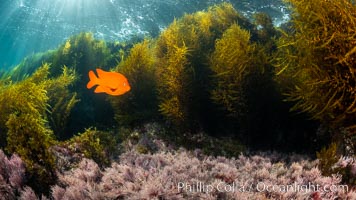
Garibaldi and Marine Algae, Coronado Islands, Mexico.
Location: Coronado Islands (Islas Coronado), Baja California, Mexico
Image ID: 36490
Location: Coronado Islands (Islas Coronado), Baja California, Mexico
Image ID: 36490
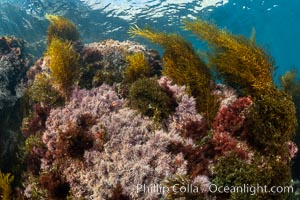
Sargassum and Marine Algae, Coronado Islands, Mexico.
Location: Coronado Islands (Islas Coronado), Baja California, Mexico
Image ID: 36491
Location: Coronado Islands (Islas Coronado), Baja California, Mexico
Image ID: 36491
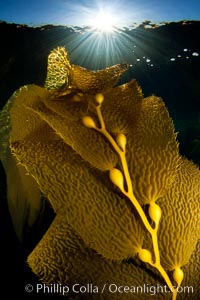
Kelp fronds and pneumatocysts. Pneumatocysts, gas-filled bladders, float the kelp plant off the ocean bottom toward the surface and sunlight, where the leaf-like blades and stipes of the kelp plant grow fastest. Giant kelp can grow up to 2' in a single day given optimal conditions. Epic submarine forests of kelp grow throughout California's Southern Channel Islands.
Species: Giant kelp, Macrocystis pyrifera
Location: San Clemente Island, California
Image ID: 25396
Species: Giant kelp, Macrocystis pyrifera
Location: San Clemente Island, California
Image ID: 25396
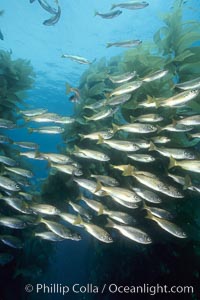
Salema schooling amid kelp forest.
Species: Salema, Macrocystis pyrifera, Xenistius californiensis
Location: Catalina Island, California
Image ID: 01022
Species: Salema, Macrocystis pyrifera, Xenistius californiensis
Location: Catalina Island, California
Image ID: 01022